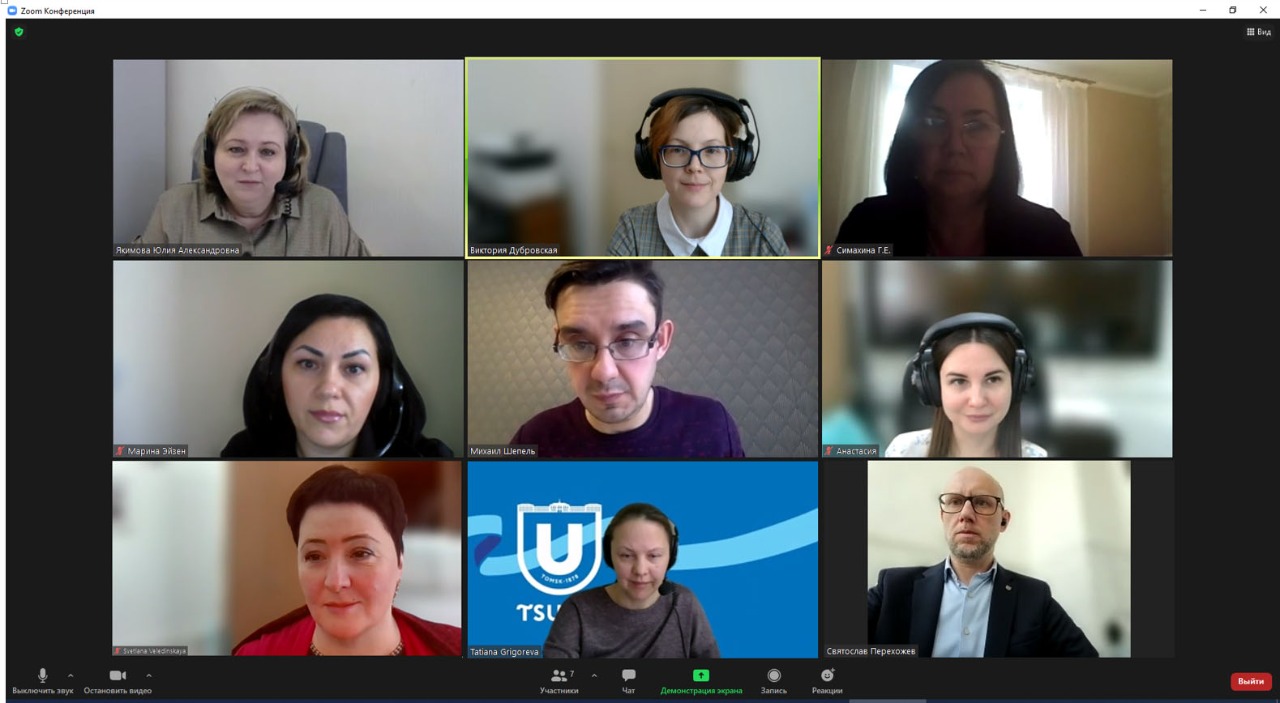It has been a year since TSU joined the Employment Promotion federal project as part of the Demography national project, which officially started in January 2019 and will be carried out until the end of 2024. One could ask why we did not join earlier. The Demography project was launched back in the pre-pandemic time and was aimed at training people of retirement and pre-retirement age, as well as vocational training and additional vocational education for women with preschool children who were unemployed and had applied to the employment service. However, the rapidly spreading pandemic caused a sharp increase in layoffs due to the closure of many enterprises and the reduction of staff. In addition, a significant number of employed citizens continue to be at risk of being fired.
Such an unforeseen increase of tension in the labor market by the end of 2020 revealed an additional need for supplementary education and retraining. This would help other categories of citizens both maintain their current level of professionalism and acquire additional skills and competencies for new employment. 
That is why the Government of the Russian Federation decided to implement measures to solve these problems. In fact, at the beginning of 2021, the Employment Promotion project was rebooted and aimed at diversifying its target audiences. It was assumed that at least 115,000 people would undergo vocational training and additional professional education every year. The Russian Academy of National Economy and Public Administration (WorldSkills Russia), a non-profit under the President of the Russian Federation, and our Tomsk State University have become federal operators of the project.
For us, this has been a big challenge. We had never faced problems of such a scale. They were addressed by universities in Central Russia. It is an unparalleled story when a regional university takes responsibility for such a huge project. I would like to thank Valeriy Falkov, the Minister of Science and Higher Education. He granted his confidence and did a lot to make TSU one of the three federal operators of the Employment Promotion project, although this project includes 85 partner universities from almost all Russian regions, which means that the Minister had a lot of other options.
Why were we chosen? Valery Falkov has visited Tomsk on several occasions and, therefore, has a good understanding of what we are capable of in terms of the expansion of professional education and  training as a regional university that has achieved high results in the 5-100 Program.
training as a regional university that has achieved high results in the 5-100 Program.
We accepted the proposal to become the operator of the federal project. We were optimistic but rather concerned: it was a huge responsibility and a lot of work ahead. Selflessly accepting the challenge, we delved into the issue, set to work, and mastered a completely new field of activity. To do this we had to find new allies, establish a call center, and visit offices in Moscow. We saw that most of the university-participants in the project were irrelevant to the situation in the labor market and, by extension, the task of the project. We urgently needed to increase our relevance and help other universities do the same. In fact, the entire system of higher professional education and training needed to be reconstructed.
And this had to be carried out simultaneously with the training since the project indicators in terms of timing and the number of trainees were and still are very strict. In addition, the project did not take into account the specifics of the university working calendar. For instance, summer is the time for vacations, which means the “dead season” for training. Because of this, more than four out of eleven months were “lost” in 2021. In other words, we had to do a year's work in six and a half to seven months. We needed to make our adult trainees happy not only with the results of their training but also with the very process.
But this was not even the most difficult challenge for the participating universities and TSU as a project operator. It was even more difficult to follow the terms of the project, according to which we had to not only train large groups of people but also find employers for them. Universities would receive 70% of the funding for educational programs upon completion (taking into account the actual number of certified trainees) and 30% following their employment. And here we were faced with the fact that a number of universities compiled their estimates in such a way as not to “bother” with employment at all. In other words, they initially decided to limit themselves to receiving not 100% of the payment for their participation in the project, but 70%, which was enough for them to be happy and satisfied. We worked very hard to overcome this trend. We persuaded, consulted, taught, and persuaded again. We had to part with those who did not want to change their policy. Needless to say, there were many complaints from those who did not agree with our policy. I must say that the Ministry, of course, took our side and provided us with great assistance in solving this unforeseen problem. High-level meetings were held almost every week.
Despite all the difficulties and risks of disrupting the project, in 2021, as a result of huge organizational efforts and educational and methodological work 64,849 Russians representing various regions were trained and certified. Most of them (47,042 people) not only improved their skills or learned a new profession, but acquired the status of self-employed and joined the labor market. Most of them (80%) were women.

Next year, we expect changes, for example, new trainees - young people who have never been employed, including young men returning from military service. But along with this, we will develop relations with large companies. We have already begun preparations for this, trying to draw the interests of such corporations as MTS, MegaFon, the LATAT MDF Plant, RosGeo, and SIBUR-Holding. We have already assisted a few corporations to recruit new employees and to retrain their staff so as to keep them relevant and employed.
I want to encourage program managers to not wait for an invitation, to take the initiative, and to redesign their programs in such a way that they become of interest to large companies. Some of our university colleagues still believe that the advanced training of employees of modern corporations can be carried out according to the same educational programs that students are trained in. But this is absolutely not true. Adults with university diplomas (sometimes more than one!) and serious work experience expect us to improve their existing qualifications, and not simply to receive basic knowledge again. They are interested in the latest technologies and techniques applicable in their professional fields. In order to meet such needs and be the bearers of the most advanced applied knowledge, our professors must constantly improve their skills and understand how certain companies work. 
As I mentioned above, in 2022 the conditions of the Employment Promotion project will change again. And this is right because one needs to keep abreast of the real labor market all the time and quickly respond to all its transformations. Now we have more than 13,000 people on the waiting list. So far, the most popular training and retraining programs are those that are somehow related to digitalization, the Internet, and services. These are all kinds of IT specialists, Internet marketers, copywriters, and web designers. The market also needs entrepreneurs, social workers, teachers, managers, and realtors.
The technologies we invested in played a special role in the successful implementation of the project in 2021. TSU is the only operator that has a unified digital LMS platform. This system (Odin) allows the recording of all the actions of the student, operator, and instructors, starting from the moment people want to participate in the project and make their first calls. All educational and methodical materials, recordings of lectures, and practical exercises are posted there; all educational activities are recorded, including the final projects of the program participants. Of course, not everything is perfect in this system yet, but we are moving in the right direction. In the conditions of distance learning and the pandemic, quality control is possible only through such technologies. We turned out to be the most prepared. We have technologies for working with adaptive content, hardware and software systems for hybrid training, the latest simulators with augmented reality (AR). All of that will lead to the development of new digital didactics. For this purpose, at the expense of the project, we have significantly updated our digital infrastructure: server resources, soft and hardware. We are participating in the development of domestic technologies to replace international ones (for example, Mind instead of Zoom).
I believe that it was the new formats of work that allowed TSU to achieve such wonderful results with which we ended our first year of participation in the Employment Promotion project. See for yourself:
In total, TSU designed and launched 68 advanced training programs in 2021. Thirty-two of them were implemented independently by TSU specialists and 36 were implemented with partners.
The TSU Institute of Distance Education has received over 15,000 positive reviews on the programs developed and implemented by our university specialists!

We have a lot of plans. But the tasks set before us for this year are the same. Therefore, I invite everyone to actively participate in the project. This will allow the departments of the university to receive additional resources for their development. We passed the first stage successfully: the experts assessed us very positively. I would like to thank all members of the TSU large team participating in the Employment Promotion project, whose professional and selfless work brought us to this success and was highly appreciated by the graduates of the programs. Special thanks goes to the staff of the Institute of Distance Education and its director Mikhail Shepel. Keep it up!
Eduard Galazhinskiy,
Rector of National Research Tomsk State University,
Acting President of the Russian Academy of Education
Translated by Snezhana Nosova
